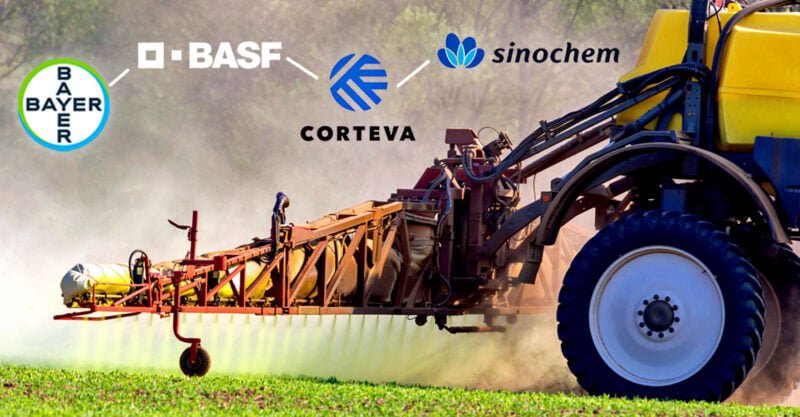The world’s four largest agrochemical companies now control more than 60% of global proprietary seed sales, by 2030 they could control all our food

The world’s four largest agrochemical companies: Bayer, DowDupont, Sinochem & BASF exert increasing leverage over the agricultural system where the concentration of power and wealth threatens 40% of local farners, hunan health, the environment and access to heatly food, according to a new report.
Aspects of the shifting paradigms in agriculture during the past 75 years can be traced to multiple factors, including World War II innovations in materials science, chemical weapons development and other technologies; the so-called “Green Revolution”; advances in genetic science and biotechnology in the last couple of decades; and most recently, the advent of uses of Big Data and the technologies that enable it.
To begin with one of those: the dawn of genetically modified seed that would resist the assaults of applied herbicides was a game changer for the agrochemical industry and ratcheted up sector consolidation (see below).
Glyphosate-resistant seed meant that farmers could plant the seed and use Roundup (glyphosate) liberally because it would not harm the plant — but would knock down weeds.
National Sustainable Agriculture Coalition writes:
“To create and mass produce a seed that would resist Roundup, Monsanto needed a captive supply of germplasm [seed].
“‘One of their main strategies,’ noted [Kiki] Hubbard [of the Organic Seed Alliance], ‘was to buy up smaller [seed] firms to access their varieties and simply insert their GE traits without needing to do any of the breeding work themselves. …
“Monsanto thus began to acquire small and regionally based seed companies, exponentially multiplying their supply of germplasm and restricting the distribution of these varieties which had been carefully bred to possess ideal traits.
“These foundations enabled Monsanto to become the first company to genetically engineer a plant cell and eventually mass produce a Roundup Ready line of seed.”
The company promoted the heck out of this pairing of proprietary seed plus herbicide, and competitors took note.
With Monsanto’s development of its flagship glyphosate herbicide (Roundup), and its acquisition of seed companies that resulted in the 1996 debut of “Roundup Ready” soybean seed, the consolidation that now characterizes most parts of the food supply system was off and running.
Now, several huge companies (see below) sell genetically modified (GM) seed for use with their herbicide products.
Not so many years ago, there were six large agrochemical companies that sold pesticides and (in some cases) synthetic fertilizers and seeds to agricultural operations.
Beyond Pesticides has covered several of the huge mergers of the past decade-plus that have reduced that number to four, including Bayer’s acquisition of Monsanto, the Dow–DuPont merger (which then reconfigured to DuPont and Corteva) and the ChemChina acquisition of Syngenta (with ChemChina subsequently acquired by Sinochem in 2021).
ChemChina had already been scooping up many smaller seed companies over the past decade; multiple of Bayer’s seed divisions were also sold off to BASF, another chemical giant, in 2018.
Today, Bayer, DowDupont, Sinochem and BASF now control more than 60% of global proprietary seed sales. Globally, sales are dominated by Corteva and Bayer.
Notably, Bayer is the inheritor of the beleaguered but ubiquitous glyphosate herbicides, most notably Roundup, that are still in extensive use around the world and often paired with GM seeds for important commodity crops, such as corn, soy, cotton, and increasingly, wheat and oat crops.
Howard — a faculty member in the Department of Community Sustainability at Michigan State University, and member of the International Panel of Experts on Sustainable Food Systems — points out in his 2016 book, “Concentration and Power in the Food System: Who Controls What We Eat?,” that control of much of the world’s food supply system by so few entities has enormous impacts on human health, biodiversity, the environment broadly, agricultural workers and rural communities.





